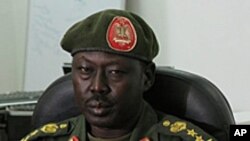The spokesman for South Sudan’s national army says it is committed to full implementation of the security arrangement in the peace agreement signed by President Salva Kiir and rebel leader Riek Machar.
The statement from the Sudan People's Liberation Army came despite local reports that sharp disagreements in the army leadership could imperil the peace accord and plunge the country into yet another conflict.
Critics of South Sudan’s government say it appears that Kiir and his administration aren't interested in sharing power with the rebels, despite the agreement. They argue that the government will use state institutions, including the army, to undermine the pact.
But army spokesman Colonel Philip Aguer said the SPLA would not thwart the agreement, which was designed to restore peace and stability to the world’s newest nation after more than two years of conflict.
“There is no division within the army or within the command of the army. ... The army made the point very clear that they are behind the peace agreement, and they will implement the pace agreement,” Aguer said. “If there are spoilers for the peace agreement, those spoilers at least are not on our side.”
Seeking anonymity, a senior military official told the Sudan Tribune, an online newspaper, that the implementation of the peace accord could be in danger.
'Signs of reluctance'
“The devil and the honesty of some of my colleagues will now be found in the implementation," the military official said. "We should have moved out of Juba town three weeks ago if there have not been signs of reluctance to comply and implement the security arrangement. Some of the officers are saying that withdrawal from Juba will create a security vacuum if the forces are withdrawn before the deployment of the joint forces.
“It will not be easy implementing security arrangements. Some of us who were selected by the same command and sent for a security arrangements workshop in Addis Ababa, Ethiopia, no longer go into meetings with the chief of general staff now. He does not even greet us when we meet. We begin to wonder and ask ourselves what mistakes we did. We thought we were only responding to the assignment.”
But army spokesman Aguer said the senior military official had misrepresented the situation on the security arrangements.
“What has happened is that the army has already demarcated the 25 kilometers outside Juba, and what was left was the provision of water and shelter for the soldiers," the spokesman said. "And if that is provided, definitely the soldiers will move where they are supposed to move to.”
His comments followed the army’s recent announcement that it had withdrawn 250 soldiers from Juba. But civil society and human rights groups say several thousand soldiers continue to remain in the city, contrary to the security arrangement in the peace accord.
But Aguer said the government has invited mediators from regional bloc, the Intergovernmental Authority on Development, to monitor the withdrawal of the SPLA soldiers.
“There is nobody against [the peace accord], and [the withdrawal] was even the plan of the army even before the conflict. The army had a plan to move outside Juba,” he said.
Aguer said the army is so far pleased with the level of cooperation between the government and the rebel leadership in the quest to restore peace following recent meetings between the former warring sides.




